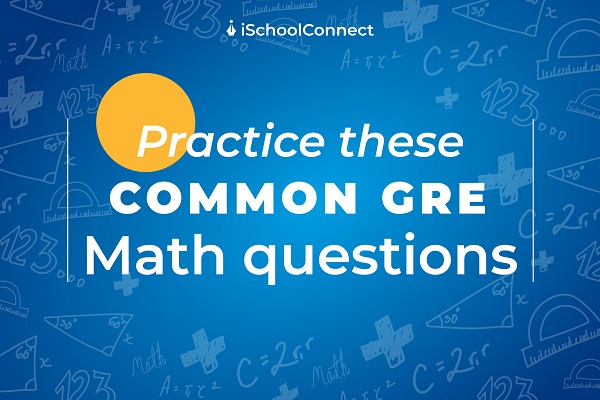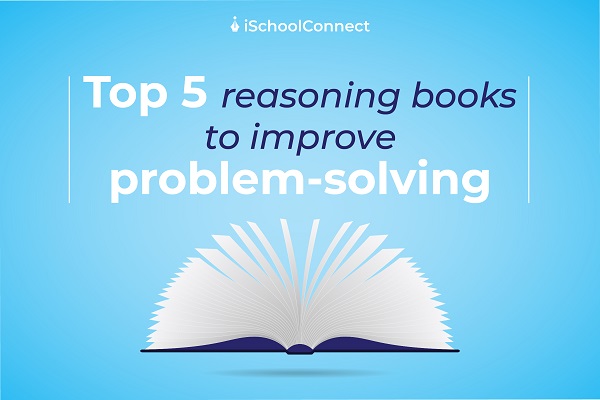Table of Contents
The GRE Quantitative reasoning section tests your basic mathematical skills and concepts. So you don’t need to worry about advanced math problems such as calculus. You need to focus on a mix of word problems, like statistics, algebra, probability, etc. It’s important to know what the GRE math syllabus actually is before getting into the tips to ace this section. Let’s get started!
What is the GRE math syllabus?
- Geometry: This includes topics such as triangles, circles, lines and angles, Pythagorean Theorem, polygon, quadrilaterals, etc. It tests you on questions like area, perimeter, volume, and much more.
- Arithmetic: Here, the topics range from arithmetic operations to the properties of integers. GRE also tests you on concepts like ratio and proportion, percentage, number line, sequence of numbers, statistics, estimation, etc.

- Algebra: Besides pure algebra, you may find an algebra question mingled with another concept. Like linear and quadratic equations, inequalities, factoring algebraic expressions, graphs of intercepts, slope of lines, inequalities and functions, word problems, etc.
- Data Analysis: The data analysis section consists of concepts revolving around visualizing or interpreting data. The question forms can range from bars, charts to scatter plots and histograms. So brush up your basics for set theory, probability, statistics (mean, median, mode, range, etc.)!

These four areas comprise the GRE math syllabus, and the question type varies. There are four question types that you would see in this section.
These include:
- Quantitative Comparison
- Numeric Entry
- Multiple Choice – Select One Answer
- Multiple Choice – Select One or More Answers
Now that you have an overall idea of what the GRE math syllabus is, it’s time we move to some common mistakes that people make. Avoid these mistakes and you’ll learn how to score 170 in GRE.
Avoid these common mistakes
Calculation errors (especially the super-silly ones!)
Do you remember solving a question correctly but marking the wrong answer? Or calculating what was not asked in the question?
All these things come under silly mistakes. And you can avoid them by being a bit aware. Read the question carefully, and half the problem is solved. Also, make sure you round off the answers correctly if asked.
Remember, ditching these pitfalls can improve your score and place you among the top-ranking students.
Conceptual
These mistakes usually happen when you are not aware of your concepts. This might land you in trouble. Students often make such mistakes in data analysis and geometry.
Make sure you do not assume anything that is not given in the question. Also, being thorough with the formulae will do wonders. You can do this by creating a formulae sheet to memorizing them.
You will also come across some twisted questions that will make you scratch your head. Pay more attention to the details of such questions and write down whatever is asked in the question. This will give you a clear idea of how to approach these questions.
GRE Quant: do’s and don’ts
By now, you must have gotten a slight idea about what not to do while preparing for the GRE Quantitative Section. In this section, we will cover what practices you should follow to be ahead in the game.

Practice
Nobody becomes an overnight success. You need to work hard to crack this exam. It can get you into your dream university.
Plan your GRE preparation, make a schedule, and stick to it. Break down your preparation into small chunks. Allot your time to each section and every concept. Be consistent with the plan you make for yourself. Keep revising whatever you have learned.
This way, you will not be overwhelmed with the numerous concepts you have to go through.
Know the test format and syllabus
This should be the first step to your GRE preparation as a whole. Go through the GRE math syllabus, know your strengths and weaknesses, and plan accordingly.
Refer to previous test papers to understand the test format. Don’t fret about taking the mock tests. These tests will give you a clear picture of what you need to improve. So, take them at frequent intervals, and analyze them well.
Learn the art of elimination
If you are stuck at a question and don’t know how to move ahead, you can try using the elimination strategy.
Use the elimination method while solving the MCQs. Rather than finding the correct answer, look for the incorrect answers to eliminate them while reading the question. It will help you save time and move on quickly to the next question. It will also increase the chances of your guess being correct.
Create an error sheet
It is okay to make mistakes as long as you learn from them. While preparing for GRE quant, make an error sheet. This sheet will make you aware of the concepts that need more attention from you.
It is an effective way of learning and keeps you on your toes. Record your progress as it will help you know your pace. Notice your weaknesses and work towards minimizing them.

Answer every question
As GRE doesn’t have negative marking, you can answer every question. But, do not get stuck on a difficult question. Mark It for review and come back to it at last.
Learn time management
Time management is crucial if you want to ace the GRE quantitative section.
You get two quantitative reasoning sections with 20 questions each. You need to complete each section in 35 minutes. This means you have less than 2 minutes to solve each question.
Notice how much time you are taking to do a calculation or problem set. Gradually, try to minimize the time if you are taking too long. The calculator present on the GRE test portal is a bit difficult to use. So, make sure you use it judiciously.
GRE Quantitative Reasoning: tips for specific topics
Arithmetic
Go through the basics of the number family and its operations to score well in arithmetic.
In quantitative comparison questions, it is always good to scan the data. So, jot down all the given numbers and variables and analyze them to implement a strategy. There might be some questions that won’t require the calculations, but just basic strategy.
Geometry
As stated above, do not assume anything (length, angle measures, etc.) that is not mentioned in the question.
Keep your scratch paper handy to break down complex geometry figures. Redrawing those figures and labeling everything as mentioned in the question will mitigate the confusion if any.
Algebra
You can go for the substitution method while solving MCQs. Substitute different values in the algebraic expressions and see if you can eliminate any given option. This practice will help you solve questions quickly. So, try and solve algebraic expressions via substitution.
Data Analysis
For data analysis, you need to be thorough with concepts and strategies to apply to specific questions. Read the graph, pie chart, scatter plot, etc., before rushing to the questions. Jot down whatever information you get from the visual representation. Identify the pattern, if any, in the given data.
Resources to refer for your GRE Quantitative Section prep
Any test preparation is incomplete without the best resources. Refer to these guides as they answer all your queries about the GRE math syllabus, important questions, scaling up scores, etc.

iSchoolConnect GRE Test Prep
iSchoolConnect provides you with a comprehensive guide to ace your GRE. Packed with video lectures, mentor support, mock tests, this is the one-stop solution to all your GRE roadblocks.
The ETS Official Guide
This guide is one of the best additions to your GRE preparation. You will get a detailed view of the exam pattern, sections, and all things important for the GRE.
You can also utilize the PowerPrep software created by ETS for your math prep. This software comprises all the topics from the GRE math syllabus. The questions are also similar to the actual GRE quantitative section.
Barron’s 6 GRE Practice Tests, Second Edition
This resource offers high-quality GRE practice tests that can help you scale up your scores. You will be able to test your quant abilities fairly with these practice tests.
We believe that now you have a roadmap to improve your GRE quantitative score. Implement these strategies, see what works best for you, and plan your preparation. If you get stuck somewhere or need some assistance, reach out to us. We’d be happy to help!
All the best!











